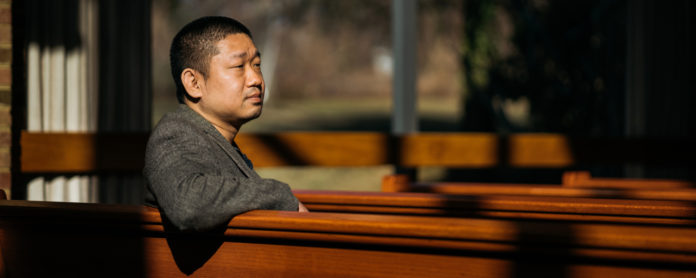
St. Lenox — the performance name of Andrew Choi — is ready to launch into the next phase of his career as one of the most unique and inspired singer-songwriters today.
His latest effort, Ten Songs of Worship and Praise for Our Tumultuous Times, carefully joins impressionistic instrumentation with intense vocals that course through an exploration of religion, belief, and locating one’s self.
St. Lenox’s fourth album comes after his longest absence, since his 2015’s debut Ten Songs About Memory and Hope, Ten Hymns from My American Gothic the following year, and Ten Fables of Young Ambition and Passionate Love in 2018. The three-year gap allowed for the production of these ten tracks, which feature his strongest songwriting and vocals to date. The stories are lived-in and relatable, owning a bold honesty and exploring spirituality through a queer perspective that asks many questions in search of a greater truth.
“I’m not particularly religious, but I grew up in a religious household,” he explained. “Even though I haven’t been actively involved in the church, I pay attention to what’s happening, and it’s weird seeing the turn it has taken over the years, from a distance. I understand why people have moved away from the church. But at the same time I also understand why people are religious. These songs are me dealing with religion, but not really in a critical or negative way, which is the tone that I think people too often take. Instead, I want the music to help people remember the hopeful feeling that I remembered, when I was growing up in the church. If that’s the starting point, then maybe people can see themselves being religious again. Maybe I can see myself being religious again. I’m not sure.”
Choi broke down the album for American Songwriter, push play and give this a read:
Deliverance –
The protagonist attends the funeral of a long-held acquaintance, reflecting on his drift from the church, and the concept of deliverance. The song sets the stage for the album, which provides a fresh take on Christianity, and praise music, in the modern day. When the song first popped into my head, I had just heard about the death of a co-worker, and was about to go on my honeymoon, so I was unable to attend the funeral. That year, I ended up attending another two funerals anyway, something that was a new experience for me. The synth track on the song is actually meant to mimic the sound of cicadas (referenced in the last stanza), which I distinctly remember after one of the funerals I attended.
Arthur is at a Shiva –
The protagonist runs into a coworker who has just come back from a shiva, leading him to reflect on several positive encounters with death in his past. The song is mostly about events that take place in the first two or three stanzas, where I’ve witnessed how religion can transform people’s reactions to death. Looking back on the song, I’m curious as to why I wrote the protagonist as giving comfort to Arthur, because I remember the real Arthur being fairly at peace at the time. Is the protagonist singing comfort to himself? Or maybe at the time I re-imagined the scene with a more distraught Arthur. The song was written about 8 years ago, so it’s hard to remember all of the artistic choices that I made at the time. The process of art is a mystery!
The Great Blue Heron (Song of Solomon) –
The protagonist recounts past experiences exploring the great outdoors with his husband, who he likens to a Great Blue Heron. The song form is intended to mirror the book of the bible, Song of Solomon, a celebration of nature and love as an analogy for worship. In some ways, the song (and several other songs) are tributes to environmentalism. However, I more meant the song as a gay revisionist reading of Song of Solomon. I think the thought in my head is, if gay love is harmonious with the beauty of nature, isn’t this proof that homosexuality and religious conviction are harmonious as well? The strict philosopher in me says that this is a fairly poor philosophical argument. But my big beautiful gay heart says “YES”.
Kroger Twilight –
The protagonist describes the secular meditative joy of grocery shopping at night. For me, the track is meant as an exercise in expansive thinking about religious experience. Many years ago, I worked in retail and then went on to spend 7 years of my life as a graduate student living on minimal income. Grocery shopping at night, and bowling at night, were relatively inexpensive things that I could do that gave me a kind of meditative peace. I can’t explain it, but I think other people will know what I’m talking about. I’m reminded of a great R.E.M. track which must have inspired the song, “Gardening at Night” off of their Chronic Town EP. Thinking about Kroger Twilight in a religious context, I think of Adam and Eve in the Garden of Eden, picking their meal causally from off the trees around them. Are grocery stores a modern day Garden of Eden, whereby capitalism has brought a religious utopia back to the people? The answer is “no”. Nevertheless, I do genuinely feel there’s something religious about the experience.
What is it Like to Have Children? –
The protagonist reflects on family history and anxieties en route to thinking about what it would be like to have a child. From one perspective, the song is meant to illustrate the beauty of specifically gay family life. From another, the song is meant to think about family life and family relationships as a kind of religious experience. I think it’s probably both. I think what I’ve liked about the song is that it is illustrating the viewpoint of a prospective parent who is at the cusp of the life-changing decision to have children. Talking to friends who have children, they’ve always talked about how it dramatically changed their life perspective. When I hear that, I think about people who talk about being born-again Christians. There is a hopefulness there that I find compelling and worth further examination.
Bethesda –
The protagonist recounts his positive experiences going to church at Bethesda Lutheran Church, in Ames, IA. If there’s one thing that has drawn me back into religious thinking, it’s the positive experiences that I had going to church when I was a child. I don’t have any further comments. That is what the song is about.
Gospel of Hope –
The protagonist, confessing himself to be non-religious, nevertheless recounts four purported miracles from his understanding: the turn of the Korean War, his interpretation of the story of Daniel and the Lion’s Den, his mother’s recovery from tuberculosis during the Korean War, and his experience camping in the woods. I should note that some of the stories here have a whiff of an unreliable narrator. I haven’t read the story of Daniel and the Lion’s Den in quite a long time, but I’m fairly sure that the song doesn’t tell it correctly. I think that’s maybe par for the course with miracles. Was my dad’s religious conviction grounded in MacArthur’s miraculous strategy during the Korean war? Was my mother’s recovery from tuberculosis the result of divine miracle? Probably not. Miracles aren’t supposed to be evidence of the divine anyway though, right? Nevertheless, it feels like a way to try and understand religious conviction. The song is about empathy for people with religious convictions.
Teenage Eyes –
The protagonist goes to an open mic, running into a middle-aged man who still dreams of becoming a rock star, causing him to reflect on his own past attempts at becoming a writer. I think for many people who drifted away from the church, religious thinking in the later years comes with a wave of nostalgia. So maybe the song is a way of thinking about religion by way of analogy, since it’s about nostalgia. Alternatively, nostalgia is really just another way of thinking about death. The background track of the song is a speech by Eisenhower who is talking about achieving Peace in Our Time. I think for me the background track fit because it puts the nostalgia into perspective. Eisenhower’s speech is fairly naïve about how to achieve world peace, so maybe nostalgia is overrated, and maybe thinking about the spark of youth is a waste of time.
Our Tumultuous Times –
The protagonist discusses the anxieties of modern day politics, drawing on his understanding of the story of Jesus for guidance on progressive life. You know, there’s been this movement in socialist circles which re-thinks the life of Jesus in socialist terms. Was Jesus a socialist? I don’t know. I don’t think the answer really matters to me. Like if we unboxed Jesus’ grave, and the empty tomb had a note in it that said “I’m a capitalist”, I probably just wouldn’t want to be that type of Christian. But when I think about Jesus as a person who was dealing with new evils and political challenges every day, and just trying to give people meaning and hope in the face of that, it’s hard not to think of Jesus as fitting the mold of a modern-day activist.
Superkamiokande –
The protagonist visits a science experiment in the mountains of South Dakota, sharing what he’s learned about neutrinos, dark matter and the universe. The science experiment was called the Homestake Experiment, and it has a sister experiment in Japan called Superkamiokande. This song is I think the most straightforward example of praise music on the record. It’s meant to give religious inspiration and hope to the people who listen to it, much like the towering spires of a cathedral near you. I remarked to someone the other day that the feeling of religious hope that I had as a child is quite similar to the feeling I get when I see pictures of outer space, and how amazingly big the universe is. The song is meant to draw on that feeling. Relatedly, I think the feeling of hope that many people feel about scientific discovery is similar to the feeling of hope that many Christians have when thinking about religion. If that gives scientists and the religious a way of understanding one another, then that’s probably a good thing.








